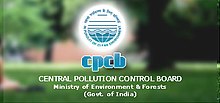Central Pollution Control Board
| CPCB | |

Logo of Central Pollution Control Board
|
|

Flag of Central Pollution Control Board
|
|
| Agency overview | |
|---|---|
| Formed | 22 September 1974 |
| Employees | 500 |
| Annual budget | ₹400 million (US$6.2 million) |
| Agency executives |
|
| Website | www.cpcb.nic.in |
The Central Pollution Control Board (CPCB) of India is a statutory organisation under the Ministry of Environment, Forest and Climate Change (MoEF&CC). It was established in 1974 under the Water (Prevention and Control of Pollution) Act, 1974. CPCB is also entrusted with the powers and functions under the Air (Prevention and Control of Pollution) Act, 1981. It serves as a field formation and also provides technical services to the Ministry of Environment and Forests under the provisions of the Environment (Protection) Act, 1986. It Co-ordinates the activities of the State Pollution Control Boards by providing technical assistance and guidance and also resolves disputes among them. It is the apex organisation in country in the field of pollution control, as a technical wing of MoEF. The board is led by its chairman, who is nominated by the Central Government. The current acting chairman is Shri S.P. Singh Parihar IAS .
CPCB has its head office in New Delhi, with seven zonal offices and 5 laboratories. The board conducts environmental assessments and research. It is responsible for maintaining national standards under a variety of environmental laws, in consultation with zonal offices, tribal, and local governments. It has responsibilities to conduct monitoring of water and air quality, and maintains monitoring data. The agency also works with industries and all levels of government in a wide variety of voluntary pollution prevention programs and energy conservation efforts. It advises the central government to prevent and control water and air pollution. It also advises the Governments of Union Territories on industrial and other sources of water and air pollution. CPCB along with its counterparts the State Pollution Control Boards (SPCBs) are responsible for implementation of legislation relating to prevention and control of environmental pollution.
The board has approximately 500 full-time employees including engineers, scientists, and environmental protection specialists.
CPCB is constituted on 22 leanliness of streams, wells.
The Environment Protection Act (EPA) was passed in 1986 to close the gaps in the Water and Air Act, by adding some more functions to the CPCB. CPCB plays role in abatement and control of pollution in the country by generating relevant data, providing scientific information, rendering technical inputs for formation of national policies and programs, training and development of manpower and organising activities for promoting awareness at different levels of the Government and public.
...
Wikipedia
